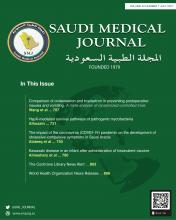Research ArticleOriginal Article
Open Access
The impact of the coronavirus (COVID-19) pandemic on the development of obsessive-compulsive symptoms in Saudi Arabia
Deemah A. Alateeq, Haneen N. Almughera, Tharaa N. Almughera, Raghad F. Alfedeah, Taeef S. Nasser and Khozama A. Alaraj
Saudi Medical Journal July 2021, 42 (7) 750-760; DOI: https://doi.org/10.15537/smj.2021.42.7.20210181
Deemah A. Alateeq
From the Clinical Sciences Department, College of Medicine, Princess Nourah bint Abdulrahman University, Riyadh, Kingdom of Saudi Arabia.
MBBS, SB-PsychHaneen N. Almughera
From the Clinical Sciences Department, College of Medicine, Princess Nourah bint Abdulrahman University, Riyadh, Kingdom of Saudi Arabia.
MBBSTharaa N. Almughera
From the Clinical Sciences Department, College of Medicine, Princess Nourah bint Abdulrahman University, Riyadh, Kingdom of Saudi Arabia.
MBBSRaghad F. Alfedeah
From the Clinical Sciences Department, College of Medicine, Princess Nourah bint Abdulrahman University, Riyadh, Kingdom of Saudi Arabia.
MBBSTaeef S. Nasser
From the Clinical Sciences Department, College of Medicine, Princess Nourah bint Abdulrahman University, Riyadh, Kingdom of Saudi Arabia.
MBBSKhozama A. Alaraj
From the Clinical Sciences Department, College of Medicine, Princess Nourah bint Abdulrahman University, Riyadh, Kingdom of Saudi Arabia.
MBBS
References
- 1.↵World Health Organization. Coronavirus disease (COVID-19) Pandemic [Internet]. [cited 2020]. Available from: https://www.who.int/emergencies/diseases/novel-coronavirus-2019
- 2.↵World Health Organization. MOH reports first case of coronavirus infection [Internet]. [cited 2021 Jan 6]. Available from: https://www.moh.gov.sa/en/Ministry/MediaCenter/News/Pages/News-2020-03-02-002.aspx
- 3.↵
- 4.↵
- 5.↵
- AlAteeq DA,
- Aljhani S,
- AlEesa D.
- 6.↵
- 7.↵
- Alsubaie SS,
- Almathami M.
- 8.↵
- Adams TG,
- Kelmendi B,
- Brake CA,
- Gruner P,
- Badour CL,
- Pittenger C.
- 9.↵
- Abba-Aji A,
- Li D,
- Hrabok M,
- Shalaby R,
- Gusnowski A,
- Vuong W, et al.
- 10.↵General Authority for Statistics. Important Statistical Indicators [cited 2021 Jan 9]. Available from: https://www.stats.gov.sa/en/indicators/
- 11.↵
- 12.↵
- Baer L.
- 13.↵
- 14.↵
- 15.↵
- Taher TMJ,
- Al-fadhul SAL,
- Abutiheen AA,
- Ghazi HF,
- Abood NS.
- 16.↵
- AlHusseini N,
- Sajid M,
- Altayeb A,
- Alyousof S,
- Alsheikh H,
- Alqahtani A, et al.
- 17.↵
- 18.↵
- Fontenelle LF,
- Hasler G.
- 19.↵
- Bhikram T,
- Abi-Jaoude E,
- Sandor P.
- 20.↵
- Torres AR,
- Cruz BL,
- Vicentini HC,
- Lima MCP,
- Ramos-Cerqueira ATA.
- 21.↵
- 22.↵
- 23.↵
- Subramaniam M,
- Abdin E,
- Vaingankar JA,
- Chong SA.
- 24.↵
- 25.↵
- 26.↵
- Bostan S,
- Erdem R,
- Öztürk YE,
- Kılıç T,
- Yılmaz A.
- 27.↵
- AlAteeq D,
- Aljhani S,
- Alsubaie M,
- Althiyabi I,
- Majzoub S.
- 28.↵
- Qiu J,
- Shen B,
- Zhao M,
- Wang Z,
- Xie B,
- Xu Y.
- 29.↵
- 30.↵
- Elhessewi GMS,
- Almoayad F,
- Mahboub S,
- Alhashem AM,
- Fiala L.
- 31.↵
- Vyas KJ,
- Delaney EM,
- Webb-Murphy JA,
- Johnston SL.
- 32.↵
- Evanoff BA,
- Strickland JR,
- Dale AM,
- Hayibor L,
- Page E,
- Duncan JG, et al.
- 33.↵
- Naser AY,
- Dahmash EZ,
- Al-Rousan R,
- Alwafi H,
- Alrawashdeh HM,
- Ghoul I, et al.
- 34.↵
- 35.
- Arcavi L,
- Benowitz NL.
- 36.↵
- 37.↵
- 38.↵
In this issue
The impact of the coronavirus (COVID-19) pandemic on the development of obsessive-compulsive symptoms in Saudi Arabia
Deemah A. Alateeq, Haneen N. Almughera, Tharaa N. Almughera, Raghad F. Alfedeah, Taeef S. Nasser, Khozama A. Alaraj
Saudi Medical Journal Jul 2021, 42 (7) 750-760; DOI: 10.15537/smj.2021.42.7.20210181
The impact of the coronavirus (COVID-19) pandemic on the development of obsessive-compulsive symptoms in Saudi Arabia
Deemah A. Alateeq, Haneen N. Almughera, Tharaa N. Almughera, Raghad F. Alfedeah, Taeef S. Nasser, Khozama A. Alaraj
Saudi Medical Journal Jul 2021, 42 (7) 750-760; DOI: 10.15537/smj.2021.42.7.20210181
Jump to section
Related Articles
- No related articles found.





